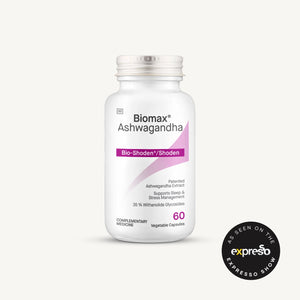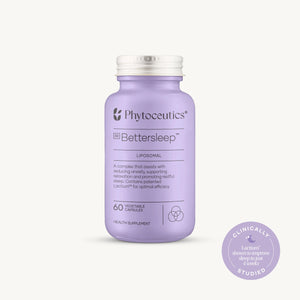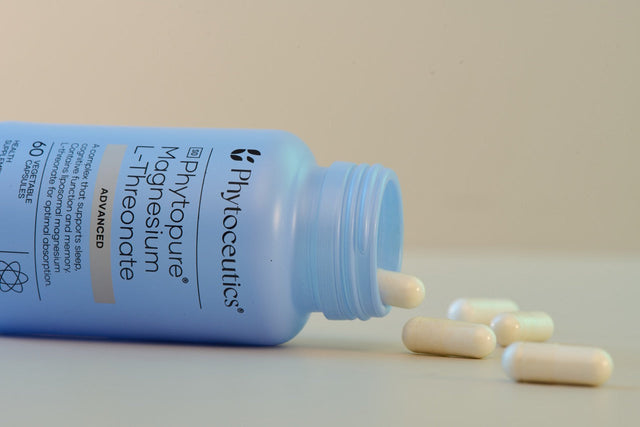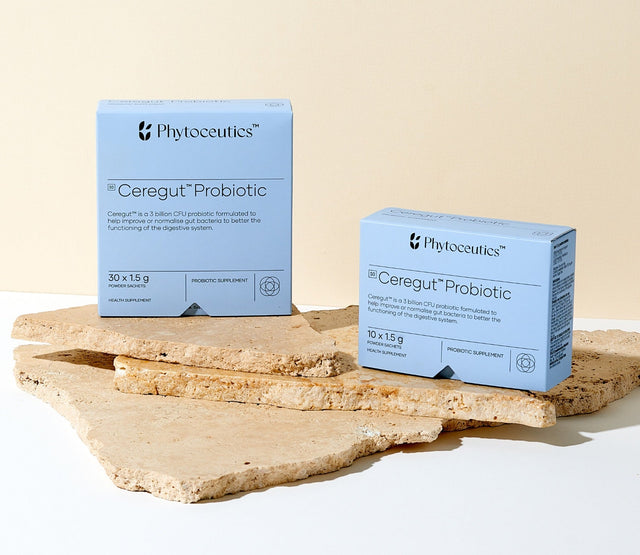Yet, in today’s fast-paced world, quality sleep often takes a back seat. If you find yourself tossing and turning or waking up feeling groggy, you’re not alone. Thankfully, targeted supplementation can offer the support your body needs to rest and recover properly.
From magnesium to calming herbs and even vitamin D, science-backed ingredients and supplements are showing real promise in improving sleep quality.
Magnesium Bisglycinate: A Foundational Mineral for Relaxation
Magnesium plays a vital role in regulating neurotransmitters that influence sleep, such as GABA (gamma-aminobutyric acid), the calming brain chemical. It also helps regulate melatonin, the hormone that controls the sleep-wake cycle [1].
Magnesium bisglycinate, in particular, is a highly absorbable form that’s gentle on the stomach. It binds magnesium to glycine – an amino acid that also promotes relaxation – making it a great choice for improving sleep onset and quality [9].
A study including 46 elderly individuals found that dietary magnesium supplementation led to a significant increase in a hormone called renin and a noticeable drop in cortisol, the body’s main stress hormone, compared to those who took a placebo. Renin plays a key role in promoting deeper, more restful non-REM (NREM) sleep. In people with normal sleep patterns, renin levels rise and fall in rhythm with the different stages of sleep. However, poor sleep can disrupt this natural rhythm. The increase in renin seen in the study suggests that magnesium may help support better sleep structure.
At the same time, the observed cortisol reduction supports earlier findings that magnesium can help calm the body’s stress-response system. This is likely due to its ability to influence certain brain receptors related to stress regulation, such as magnesium's natural N-methyl-D-aspartic acid (NMDA) antagonistic activity. These findings suggest magnesium may enhance sleep quality by modulating hormonal pathways involved in the sleep–stress cycle [1].
Try Phytoceutics® Phytopure® Magnesium Complex which combines four bioavailable forms of magnesium, including bisglycinate, to promote relaxation and support sleep.
Lactium®: A Nature-based Sleep Aid
Lactium® is a bioactive milk peptide that works by selectively binding to GABAA receptors in the central nervous system, enhancing the activity of gamma-aminobutyric acid (GABA) – a neurotransmitter known for promoting relaxation and reducing anxiety. Lactium is non-habit-forming, even at higher doses, offering a natural and effective way to support calm and restful sleep.
A recent double-blind, placebo-controlled clinical trial investigated the effects of LTC-022 – a dietary supplement containing Lactium® and L-theanine – on adults experiencing sleep disturbances. Over 8 weeks, participants who took the supplement showed significant improvements in key sleep parameters, including increased total sleep time, reduced time to fall asleep, improved sleep efficiency, fewer nighttime awakenings, and earlier bedtimes, as tracked in detailed sleep diaries. These specific improvements suggest that Lactium® plays a meaningful role in supporting more restful, sustained sleep.
Try Phytoceutics® Bettersleep™, containing GABA, Lactium ® and L-Theanine, all clinically studied and proven to support anxiety, promote calm and relaxation, and improve sleep.
Ashwagandha: Adaptogenic Support for Stress and Sleep
Ashwagandha (Withania somnifera) is a well-known adaptogenic herb that helps the body manage stress – a common factor behind disrupted sleep [2]. Research shows that elevated cortisol levels, especially at night, can suppress melatonin production. Since melatonin plays a key role in regulating the sleep-wake cycle, this suppression may lead to delayed sleep onset [12]. Several clinical trials have demonstrated that ashwagandha supplementation can significantly reduce cortisol levels in individuals experiencing stress [11]. By helping to lower cortisol, ashwagandha may indirectly support melatonin production and promote better sleep quality.
A randomised, double-blind, placebo-controlled study conducted in India evaluated the effects of ashwagandha root extract on sleep and anxiety in 60 patients with insomnia. Participants in the test group received 300 mg of high-concentration ashwagandha extract twice daily for 10 weeks. Compared to placebo, those taking ashwagandha showed significant improvements in sleep onset latency, sleep efficiency, sleep quality, and anxiety scores. After 10 weeks, sleep efficiency increased notably, and sleep latency was significantly shorter. The extract was well tolerated, suggesting ashwagandha may be an effective natural therapy for improving sleep and reducing anxiety in people with insomnia [3].
Try Biomax® Ashwagandha to support the body's stress response, relax the nervous system, and promote deeper, restorative, and uninterrupted sleep.
Vitamin D: A Sunshine Vitamin with Surprising Sleep Benefits
While vitamin D is primarily known for supporting immune and bone health, emerging research suggests it also plays a role in sleep regulation. Low levels of vitamin D have been linked to shorter sleep duration, poor sleep quality, and increased sleep disturbances [4]. Vitamin D also plays a role in the biosynthesis of melatonin, a hormone crucial for sleep-wake regulation, and influences the enzyme that converts tryptophan to serotonin, a precursor to melatonin. By modulating serotonin levels, vitamin D indirectly affects melatonin production, thereby influencing sleep patterns [15].
A double-blind, placebo-controlled clinical trial conducted on 89 adults with sleep disorders found that vitamin D supplementation significantly improved sleep quality. Participants who received 50,000 IU of vitamin D every two weeks for 8 weeks showed reduced sleep latency, increased sleep duration, and better overall sleep quality compared to the placebo group. These improvements remained significant even after adjusting for factors like diet, sun exposure, and physical activity, suggesting that vitamin D may be an effective support for improving sleep in adults aged 20–50 [4].
Phytoceutics® Phytomist® Vitamin D3 Oral Spray delivers high-potency vitamin D in an easy-to-use oral spray, ideal for supporting immunity, bone health, and sleep health simultaneously.
The Bigger Picture: Why Quality Sleep Is Non-Negotiable
Sleep isn’t just a passive state – it is an active period during which the body undergoes essential repair and regulatory processes. Here’s how poor sleep can disrupt key systems:
Immune Function
Sleep is critical for maintaining the surveillance function of the immune system. Sleep strengthens your immune defense, and in turn, your immune system influences how and when you sleep – especially during illness or inflammation. Both systems work together to keep your body healthy and resilient. A 2021 study found that chronic sleep loss weakens immune defense mechanisms and may even impair vaccine response [5].
Hormonal Balance and Metabolism
Inadequate sleep alters hormone secretion, including insulin, leptin, and ghrelin, leading to increased appetite, impaired glucose metabolism, and hormonal imbalances [6]. Disrupted sleep has also been linked to thyroid and reproductive hormone imbalances, particularly in women [7].
Cognitive Health and Memory
Chronic sleep deprivation impairs memory consolidation, focus, reaction time, and decision-making abilities. It may also accelerate cognitive decline and increase the risk of neurodegenerative conditions like Alzheimer’s disease [8].
Lifestyle Tips to Support Supplements
While supplements can be extremely helpful, their benefits are amplified when paired with healthy sleep hygiene habits:
- Stick to a regular sleep schedule, even on weekends.
- Limit blue light exposure at least one hour before bed.
- Avoid caffeine and alcohol late in the day.
- Creating a cool and dark sleep environment to signal to your body that it’s time to wind down.
- Get natural light exposure during the day to regulate circadian rhythms [10].
When it comes to better sleep, supplements can be a powerful part of your toolkit. Magnesium bisglycinate, vitamin D, calming adaptogens like ashwagandha, and ingredients like GABA, Lactium, and L-Theanine all offer evidence-based support for falling asleep faster, staying asleep longer, and waking up feeling refreshed.
Disclaimer: This content is for informational purposes only and does not constitute medical advice. Always consult with your healthcare provider before starting any new supplement, especially if you are pregnant, nursing, have a medical condition, or are taking prescription or chronic medication.








